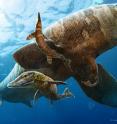What life was like for newborn giant sea lizards during the age of the dinosaur
Related images
(click to enlarge)
Many scientists have studied fossils from gigantic marine lizards called mosasaurs that lived at the time of the dinosaurs and flourished in ancient seas, but little is known about aspects of their breeding and birth. Investigators have gained new insights from young mosasaur specimens collected over 100 years ago that had previously been thought to belong to ancient marine birds. Their findings are published in Palaeontology.The team noted that the specimens show a variety of features related to the jaws and teeth that are only found in mosasaurs. "Coming across these tiny mosasaur specimens was really serendipitous," Field said. "It's not every day that you're able to shed new light on the biology of animals that went extinct 65 million years ago," said lead author Daniel Field.Analyses of the specimens indicate that even newborn mosasaurs occupied open oceanic habitats and were likely born in this setting. "Contrary to classic suggestions, these findings suggest that mosasaurs did not lay eggs on beaches, and that newborn mosasaurs likely did not live in sheltered nearshore nurseries," said co-author Aaron LeBlanc.
Source: Wiley
Other sources
- A new beginning for baby mosasaursfrom Biology News NetFri, 10 Apr 2015, 23:30:07 UTC
- Giant sea lizards in the age of dinosaurs: A new beginning for baby mosasaursfrom Science DailyFri, 10 Apr 2015, 21:30:22 UTC
- A new beginning for baby mosasaursfrom PhysorgFri, 10 Apr 2015, 16:00:40 UTC
- What life was like for newborn giant sea lizards during the age of the dinosaurfrom Science DailyFri, 10 Apr 2015, 16:00:25 UTC
- A new beginning for baby mosasaursfrom Science BlogFri, 10 Apr 2015, 15:00:18 UTC
